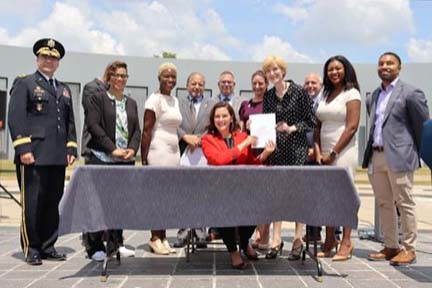
Whitmer Makes Appointments to Boards and Commissions

FOR IMMEDIATE RELEASE June 10, 2021 Contact: [email protected]
Governor Whitmer Makes Appointments to Boards and Commissions
LANSING, Mich. — Today, Governor Gretchen Whitmer announced the following appointments to the Michigan Board of Audiology, Michigan Board of Counseling, Mackinac Island State Park Commission, Michigan Board of Podiatric Medicine and Surgery, and the Ski Area Safety Board.
Michigan Board of Audiology
Christine E. Gower, of Howell, is an audiologist with Srinivas Mukkamala, M.D., PLC.
The Michigan Board of Audiology was enacted as part of the Public Health Code to license audiologists who apply nonmedical and nonsurgical principles, methods, and procedures related to disorders of hearing. The Board promotes and protects the public’s health, safety, and welfare, and has the obligation to take disciplinary action against licensees who have adversely affected the public’s health, safety, and welfare.
This appointment is subject to the advice and consent of the Senate.
Michigan Board of Counseling
Lesley E. D. Addison, of Marquette, is a school counselor for Marquette Area Public Schools. She holds a Bachelor of Arts in English and Psychology and an education certificate from Albion College. Mrs. Addison is appointed to represent the general public for a term commencing July 1, 2021 and expiring June 30, 2025. She succeeds Harold Koviak whose term expires June 30, 2021.
Charles L. Corley, II, of Westland, is an assembly line worker and alternate team lead for Ford Motor Company. He holds a Bachelor of Science in Criminal Justice from Eastern Michigan University. Mr. Corley is appointed to represent the general public for a term commencing June 10, 2021 and expiring June 30, 2022. He succeeds Jana Simmons who has resigned.
Napoleon Harrington, of Auburn Hills, is a therapist and the founder of Ambassador Counseling and Resource Group, PLLC. He holds a Bachelor of Arts in Human Resource Development and a Master of Arts in Counseling in Community/Agency from Oakland University. Mr. Harrington is appointed to represent members engaged primarily in the administration of counseling services for a term commencing July 1, 2021 and expiring June 30, 2025. He succeeds Harold Love whose term expires June 30, 2021.
Sheri Pickover, Ph.D., of Wixom, is an associate professor and program director with the Central Michigan University Department of Counseling and Special Education. She holds a Bachelor of Arts in Psychology, Creative Writing, and Literature from the University of Michigan, a Master of Science in Education in Psychological Services from the University of Pennsylvania, and a Doctor of Philosophy in Education in Counseling from Oakland University. Dr. Pickover is ap
The Michigan Board of Counseling was enacted as part of the Public Health Code to license counselors who render to individuals, groups, families, organizations, or the general public a service involving the application of clinical counseling principles, methods, or procedures in an educational, business, health, private practice, or human services setting. The Public Health Code mandates certain responsibilities and duties for a health professional licensing board including promoting and protecting the public’s health, safety, and welfare.
These appointments are subject to the advice and consent of the Senate.
Mackinac Island State Park Commission
Daniel J. Loepp, of Bloomfield Hills, is the president and CEO of Blue Cross Blue Shield of Michigan. Mr. Loepp is the vice chair of the Downtown Detroit Partnership and chair of the Partnership’s Executive Co
Hank Meijer, of Grand Rapids, is the executive chairman of Meijer, Inc. Mr. Meijer is the vice chairman of the Gerald R. Ford Presidential Foundation and a member of the University of Michigan’s President’s Advisory Group and the Ford School of Public Policy board of advisors. He holds a bachelor’s degree from the University of Michigan. Mr. Meijer is appointed to represent Independents for a term commencing June 10, 2021 and expiring April 12, 2027. He succeeds Dick Posthumus whose term expired April 12, 2021.
The Mackinac Island State Park Commission was formed in 1895 and is responsible for all aspects of managing Mackinac State Historic Parks. The Commission retains and exercises its authority and responsibility for developing the mission, goals, policies, objectives and direction for the unique properties under its jurisdiction.
These appointments are subject to the advice and consent of the Senate.
Michigan Board of Podiatric Medicine and Surgery
Charlotte Y. Bradley, of Detroit, is the SAP Tenant project manager at GST
Jeffrey H. Frederick, D.P.M, of Franklin, is the executive vice president of Podiatry Risk Group, LLC. He holds a Bachelor of Science in Psychology and a Doctor of Podiatric Medicine from the Ohio College of Podiatric Medicine. Dr. Frederick is appointed to represent podiatrists for a term commencing July 1, 2021 and expiring June 30, 2025. He succeeds Vicki Anton-Athens whose term expires June 30, 2021.
Jodie N. Sengstock, D.P.M., of Canton, is a podiatrist with Garden City Hospital and an independent contractor with Jo
The Michigan Board of Podiatric Medicine and Surgery was formed to license and regulate the practice of podiatric medicine and surgery, which is defined in the Public Health Code as the evaluation, diagnosis, management, and prevention of conditions of the lower extremities, including local manifestations of systemic disease in the human foot and ankle, by attending to and advising patients and through the use of devices, diagnostic tests, drugs and biologicals, surgical procedures, or other means.
These appointments are subject to the advice and consent of the Senate.
Ski Area Safety Board
Samuel Bracket, of Kingsford, is the general manager of Pine Mountain Resort in Iron Mountain. Mr. Bracket is appointed to represent Upper Peninsula ski area managers for a term commencing June 10, 2021 and expiring June 8, 2024. He succeeds Andrew Farron who has resigned.
Dana Carnevale, of Grawn, is the li
Timothy P. Meyer, of Cadillac, is the mountain oper
The Michigan Ski Area Safety Board was created to license and regulate ski areas and ski lifts in Michigan. The Board works with the Department of Licensing and Regulatory Affairs to oversee the operation of ski areas, surface and chair lifts, and rope tows. |









